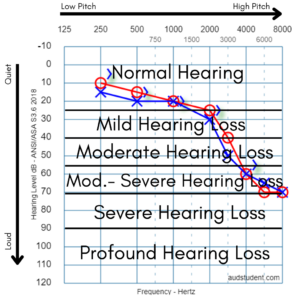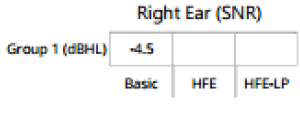A trustworthy resource for the community
There is a wealth of information about hearing health online, but not all of it is accurate or comprehensive. The information on our website has been thoroughly reviewed by our team. If you have any questions about what you find here, other online sources, or hearing health in general, please feel free to email aparc@purdue.edu.
Jump to:
Red Flags to Heed
Hearing
These are signals in your day-to-day life that may indicate that you should have your hearing tested:
- You find yourself asking for others to repeat what they are saying.
- You need to turn the volume up on your TV, radio, or phone.
- You notice ringing in your ears.
- You find yourself misunderstanding what is being said to you.
- You have difficulty following conversation, especially in noisy environments.
- You feel fatigued after attending an event where you spent most of your time trying to have conversations.
- You feel as though people are mumbling when they speak to you.
- You have a hard time locating sounds around you.
Medical
The Food and Drug Administration (FDA) has identified several “red flag” conditions related to hearing. If you have any of these conditions or symptoms, it is recommended you have you see a medical physician in addition to an audiologist.
Listed below are free health clinics in the Indy area.
- A sudden hearing loss. If you have a hearing loss that comes on suddenly with no known cause this is considered a medical emergency. If you cannot get an appointment with your primary care physician or an ear, nose and throat specialist, you should be seen at an urgent care center or in an emergency room. Sudden hearing loss can be treated in some cases, but only if action is taken within the first few days after onset.
- Active drainage coming from your ears. This includes blood, puss and anything coming from your ear that is not wax.
- A foreign body in your ear. This means something is in your ear other than ear wax or water. This will have to be removed by a medical provider before seeing the audiologist for a hearing test.
- Dizziness. Though some forms of dizziness can be caused by issues in your ear, it is important to rule out other causes of your dizziness.
Free Health Clinics
Hearing Testing
When you have your hearing tested, the hearing care professional will conduct a variety of tests, each providing information about a specific aspect of your hearing system. They will look at all your results together to determine a diagnosis and a specialized treatment plan for you. If you have any questions about how to interpret your hearing test, please feel free to email aparc@purdue.edu, or visit us in person at 1220 Waterway Blvd., Suite H120, Indianapolis.
What to expect: The provider will shine a light with magnification to look into your ear canal.
What results indicate: the health of your ear canal and ear drum.
What to expect: The provider will put a squishy tip in your ear to change the pressure in your ear canal. You don’t need to do anything but stay still and quiet.
What results indicate: how well your ear drum can move. This can reveal if the ear has too much ear wax and/or fluid behind the ear drum among other things.
What to expect: The provider will place a squishy tip in one or both of your ears. You will hear very loud sounds. You will need to stay still and quiet. If the sound becomes too loud, remove the tip from your ear and tell your provider.
What results indicate: information about many parts of your auditory system that your provider can use with other test results to make a diagnosis.
What to expect: The provider will put a tip in your ear and you will hear a variety of tones. You will need to stay still and quiet. This test is commonly used for children and patients who cannot complete a typical hearing test.
What results indicate: information about the health and function of critical parts of your hearing system, the outer hair cells and cochlea.
What to expect: The provider will put headphones on you and ask you to respond whenever you hear a beep. You will respond either by raising your hand or pushing a button. You will need to respond every time you hear the beep even when it sounds very quiet or far away. This process will be repeated as you wear a bone oscillator, which will check a different part of your hearing system. The bone oscillator is a headband with a little box that sits behind your ear. It needs to be quite tight to work properly, but the provider will get the needed information as quickly as possible.
What results indicate: how well you can hear different pitch tones. This gives your provider the degree of your hearing loss at each pitch (or frequency). Comparing the results from the headphones and bone oscillator allows the provider to determine what part of your hearing system is causing the hearing loss. This will help them determine what can be done to help you hear better.
What to expect: You will hear words through some form of headphones. The words should be at a level that makes them loud enough for you to easily hear them, but not so loud that they hurt your ears. You will repeat each word you hear as best you can.
What results indicate: how well you can understand speech in a best-case scenario, i.e. loud enough, no distractions, no background noise, no reverberation, etc.
What to expect: You will wear some form of headphones and be asked to repeat target words or sentences while there are other voices speaking or another form of background noise.
What results indicate: how you hear in real life. The world is a noisy place!
How to read your hearing test
The audiogram displays the softest tones you can hear at different pitches. The closer to the top of the chart the symbols are the quieter the tone could be and you could still detect it. If the symbol is further down the chart it means the tone had to be loud for you to hear it. X is the left ear. O is the right ear.
WRS is Word Recognition Score. That is how well you can repeat words when the volume is loud enough for you to be able to easily hear them. It is a percent correct, the higher the percentage the better.
Types of Hearing Loss
There are three types of hearing loss you may be diagnosed with:
This means your hearing loss is due to an issue with your ear canal, ear drum or your middle ear (the space behind your ear that connects with your throat). Causes could be, but are not limited to, too much ear wax, a hole in your ear drum or fluid behind your ear drum. This type of hearing loss may be fixable with treatment from an ear, nose, and throat (ENT) physician.
This means that your hearing loss is due to an issue with your inner ear, auditory nerve, or even higher in your hearing system. Many issues can cause this type of hearing loss and providers are not able to differentiate them with current tests. One of the goals of APARC is to help develop testing strategies that will allow precise diagnoses of these types of hearing losses to improve treatment options. This type of hearing loss is not yet fixable but is generally treatable with hearing aids or other devices depending on the severity of the hearing loss.
This means your hearing loss is due to a combination of conductive and sensorineural hearing loss. With a conductive component to this type of hearing loss, you will be referred to an ENT physician to see if that portion of your hearing loss can be fixed.
Hearing Aids
There is a significant amount of information about hearing aid choices available online. However, not all this information is accurate. We recommend verifying the sources of online hearing-aid information. Listed below are reliable sites that provide unbiased information on a variety of hearing-aid topics.
What styles of hearing aids are available?
https://www.fda.gov/medical-devices/hearing-aids/types-hearing-aids
Are over the counter hearing aids right for you?
What brand of hearing aids should I get?
https://www.hearingtracker.com/
Will my insurance cover hearing aids?
https://www.healthyhearing.com/help/hearing-aids/insurance-financial-assistance
Can I get financial assistance for my hearing aids?
Tinnitus
Research indicates that 11.2% of people in the United States have tinnitus or ringing in the ears. For some, this is infrequent and not bothersome; for others it can affect day-to-day life and ability to sleep. While there is no known cure for tinnitus, there are many treatment options available.
- The American Tinnitus Association has great information about tinnitus, current treatments available and support groups.
- If you are having thoughts about ending your life due to your tinnitus, or any other reason, please call 988.
Contact Us
Email us at APARC@purdue.edu



